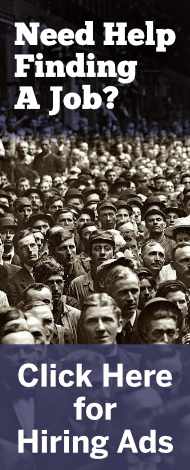By: Bryce Steiner
I was at the Paulding County Economic Development press conference on Thursday about the Union Bank and the new coffee Shop “Grounded” announcement. While I was there Dave Burtch opened up the floor for business/economic ideas in Paulding County. One young man from Youth For Christ asked one of the top things he hears from young people just happen to be the lack of entertainment or places to hang out.
The question made me think as Burch reminisced about the “good old days” when there were bowling alleys, sock hops and theaters open in Paulding. It’s true, the small towns were happening places decades ago.
So, why did Paulding lose the entertaining places that families and young people once were able to go and have fun right in the community. Expand that out a little and you see that the entire county went through that. Now think about the entire nation – that happened everywhere. It wasn’t a bad decision fifty years ago in Paulding County that made these small entertainment businesses evacuate.
Looking back in history there appears to be a correlation between the minimum wage and small town shrinkage. In the early part of the 20th century a majority of people lived and worked and their same town. The advent of the automobile began the change of people being able to commute from small town to metro areas if they chose. Small towns still thrived during this time as young people could get jobs in the small towns and as they gained experience and productivity, their pay would increase or it gave an opportunity to seek more advantageous work.
The minimum wage standard was put into place to help ensure that workers could get a wage to raise a family on. Those days are quite different now as the buying power has faded, and I believe due to the minimum wage. The problem is that some work is more valuable then others and to force something like that in a locale that does not have a large number of people, businesses can no longer pay the required amount, and they shutdown – hence the entertainment leaving small town america.
The next $1400 per person stimulus bill that everyone feels they need so badly, includes a piggy-back stipulation that more than doubles the federal minimum wage from $7.25 to $15. Some argue that this is a long time coming.
What happens if the minimum wage goes to $15 per hour? Will everyone suddenly be able to have all their dreams come true and pay off their debts, buy homes, and more? Imagine what you could do with $15/hr?
The increased pay sounds great! Who wouldn’t want more money? Let’s take a deeper look into this and see if it is as simple as that.
Money is nothing more than a labeled value of a person’s labor. Some have been pushing something called “equity” lately – that all should end up the same no matter where they started or the choices that were made. The US Founders had a different vision for us – life, liberty and the pursuit of happiness. This is based on equal opportunity. The difference is if “Joe” and “Bill” are both hired to pick apples in an orchard. Joe picks 25 bushels in a day and Bill picks 10 apples in a day – should they both be paid what their labor earned or should they be paid equal? Pay them both $100 for a day’s labor or pay Joe $250 and Bill $100? One gives the opportunity for advancement and better earnings based upon commitment and productivity. The other is considered more “equitable” but doesn’t reward anyone for their hard work.
If the minimum wage goes to $15 there will be consequences.
1. Joe and Bill might end up getting paid the same because the owner can’t afford to pay both what they actually deserve based upon their production. That would harm Joe and “reward” Bill even though there was a much greater production out of Joe.
2. The business owner decides not keep Bill because it costs more to pay than what the owner is able to make off the apples that he picked.
3. The owner might just have to double his prices to cover the extra cost to increase both of Joe and Bill’s pay to meet minimum and pay Bill for the 2.5x extra productivity.
4. The owner might shutter the business because it’s no longer profitable and people can’t pay double amount for the apple than it cost. Both Joe and Bill are now out of a job and so is the owner that made the job possible.
5. The business may decide to stay in business by importing apples from China since they don’t have fair trade or the same rules on minimum wage.
6. The owner may decide that he will just forgo the legal workers and turn to automation – or maybe pay others under the table.
7. No one will want to start a business that has to hire people.
There really are lots of things that will happen to our community workers – and none are good options. Losing valuable workers is very important, would anything else happen? Unfortunately, yes. The most obvious is that pretty much every price of product made in this country will need to double. That means that your purchasing power is halved. It’s like playing monopoly and you change the rules to have Go changed to $400 per round but then Boardwalk now cost $800 to buy.
That’s bad, but anything else? Do you have savings, 401K, HSA? The money you have saved up could also be halved because of inflation.
Couldn’t they just increase minimum wage more? Sure, with more inflation. Government mandates on money do not succeed because money is based upon actual productivity.
In 2007 Zimbabwe had a financial crisis that sent their currency out of control by trying to mandate pricing and wages through equitability. It didn’t turn out well. The country had a crisis they were trying to outsmart economics, “However, Zimbabwe’s peak month of inflation is estimated at 79.6 billion percent month-on-month, 89.7 sextillion percent year-on-year in mid-November 2008”. By 2009 they had to stop printing money. It was worthless. People who had $200,000 saved for retirement, in one year had enough to buy a chicken sandwich. We also know that price controls have not worked in California’s housing crisis, either. Though, with nearly a million people leaving California in 2020, and the rate seems to be increasing for 2021, maybe it won’t be a problem.
Would that happen here? I sure hope not, but the more money that is printed without a GDP to back it, the possibility is there.
What is the solution? The government would be better off letting workers and employers negotiate their own wages and backing off.
Areas around the nation are drastically different. The ground in NW Ohio is much more productive than in the Las Vegas. There is no such thing as equitability. You cannot make people equal unless you bring everyone down. But you can have equal opportunity. Those with ambition, great ideas, persistence, and just being able to show up on time, will do much better than those who don’t. It works and has worked great for many years.
After the minimum wage of $15 passed in the House of Representatives, the author, rep. Tlaib from Michigan, said they would immediately start writing the bill for $20/hr minimum wage. I’m wondering why they just didn’t go for $20 to begin with? The nonpartisan Congressional Budget Office (CBO) recently concluded that a $15 federal minimum wage could result in up to 3.7 million people becoming unemployed.
If financial problems can be solved by minimum wage regulations, why not just just make it $100 per hour. If that’s good, then a $1,000,000 per hour must be great! What we have here is people trying to make rules who have, for the most part, never owned, or operated a business. And unlike the Federal government, responsible business must actually have a balance sheet.
There can be a solution to this problem of not having local business or entertainment in our communities and that is to let the local communities decide for themselves what needs done and get rid of the federal minimum wage altogether. This will bring economic opportunities and competition back for the betterment of communities, employers and workers. It will allow young people to get a chance to earn something more valuable than money – experience., while still making money. If this minimum wage regulation goes through it will just put the nail in the coffin for our young people, their entrepreneurship and small town America as a whole.










